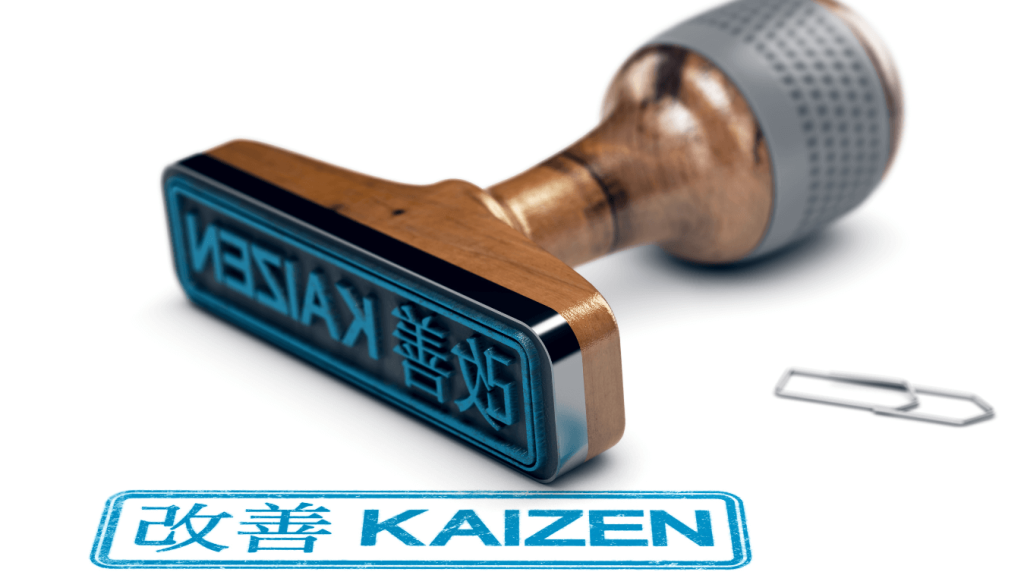
Table of Contents
Subscribe & Get Yours Goal Setting Template for 2024
Benefits of Implementing Kaizen in Business
Kaizen in Business-In business, change is the only constant. Companies try to adapt, grow, and meet evolving challenges. But how can they navigate this ever shifting landscape effectively? That’s where Kaizen in business help us. It’s not a complicated concept it is simple, yet powerful approach to making your company better.
This article is all about how Kaizen can bring meaningful improvements to your business. From saving time and money to boosting quality and empowering your team, we’ll explore the real world benefits of embracing Kaizen in your daily operations. So, let’s discover why Kaizen in business is important. It’s importance is practical path to success.
What actually the term Kaizen in Business is ?
Kaizen in business means a continuous improvement system that focuses on making small, gradual changes to processes, tasks, and workflows to achieve greater efficiency, quality, and overall performance. The word ‘Kaizen’ originates from Japan, where ‘kai’ means change and ‘zen’ means good. In the business context, Kaizen emphasizes the pursuit of constant improvement and encourages employees at all levels to actively participate in identifying and implementing better practices.
This approach is tied in with fostering a culture of ongoing learning and innovation, with a definitive objective of enhancing efficiency, reducing waste, cutting expenses, and, in turn, increasing client satisfaction.Kaizen in Business isn’t simply an administration idea; it’s a pragmatic and sustainable way for organizations to remain serious and prevail in a steadily evolving market.
How Does Kaizen Work in Business ?
Kaizen in Business works as an orderly and iterative way to deal with progress. There’s no need to focus on making revolutionary, troublesome changes, yet rather about making little, reasonable changes with the objective of continual upgrade. This interaction begins with identifying regions that need improvement, involving all degrees of representatives, and gathering their insights. When the issues are pinpointed, the group cooperates to find pragmatic arrangements.
These arrangements are then carried out, and the outcomes are firmly checked. If necessary, further changes are made, creating a circle of steady improvement. This incremental advancement prompts significant, long haul gains in productivity, quality, and generally business execution.Kaizen is a cooperative and sustainable methodology that enables representatives and guarantees that organizations stay light-footed and cutthroat in a quickly changing business scene.
Examples of Kaizen in Business:
1. Process Streamlining:
One of the most well-known instances of Kaizen in business is the streamlining of cycles. Organizations frequently utilize Kaizen principles to make little yet effective changes in their creation, manufacturing, or administration conveyance processes. This might involve optimizing work processes, reducing superfluous advances, and eliminating bottlenecks, resulting in increased effectiveness and decreased lead times.
2. Inventory Management:
Successful inventory the board is basic for businesses. Kaizen in business helps in maintaining ideal inventory levels. It involves standard appraisal of inventory needs and adjusting ordering and stockpiling rehearses accordingly. This minimizes abundance stock and diminishes carrying costs.
3. Quality Control:
Kaizen likewise assumes a fundamental part in ensuring and improving item or administration quality. By empowering workers to recognize and resolve quality issues as they emerge, businesses can roll out incremental improvements to upgrade the general nature of their offerings. This approach is especially advantageous for industries like manufacturing and medical services.
4. Working environment Association (5S):
Implementing the 5S system, a central piece of Kaizen, is one more illustration of how businesses can benefit. This approach centers around Sort, Put together, Shine, Normalize, and Sustain. It prompts a more coordinated, mess free, and proficient work environment, which adds to increased efficiency and representative fulfillment.
5. Representative Commitment:
Kaizen in business isn’t just about processes; it’s likewise about individuals. Engaging representatives in the continuous improvement process is a key model. Businesses urge their staff to give thoughts and ideas to progress, fostering a culture of innovation and involvement. This frequently prompts better resolve and collaboration.
6. Client Input Integration- Kaizen in Business:
Companies that adopt Kaizen principles actively seek feedback from customers. By paying attention to what customers say and making changes based on their feedback, businesses show their commitment to providing products or services that better meet customer needs and expectations.
These examples show how the concept can be used in various areas of an organization to achieve continuous improvements, ultimately resulting in greater competitiveness and customer satisfaction
Key Advantages of Kaizen in Business

Incorporating Kaizen in business rehearses brings about a large number of important benefits, making it a fundamental technique for sustainable development.
Enhanced Efficiency
Streamlined Cycles
One of the champion advantages of Kaizen is the streamlined cycles it offers. By eliminating pointless advances, optimizing work processes, and improve efficiency, businesses essentially improve their general productivity
Worked on Quality
Continuous Quality Upgrade
Kaizen’s accentuation on continuous improvement stretches out to quality. By continually assessing and fine-tuning items and administrations, businesses maintain and frequently upgrade their quality principles, satisfying clients and remaining serious.
Cost Decrease
Wastage Decrease
Through the distinguishing proof and elimination of inefficient practices, Kaizen lessens costs. This includes cutting pointless inventory, reducing energy utilization, and optimizing asset use.
Enabled Labor force in kaizen business
Representative Involvement
Engaging representatives in the Kaizen cycle enables them to propose upgrades, fostering a culture of cooperation and innovation. This prompts a more propelled and useful labor force.
Consumer loyalty
Consumer loyalty
By integrating client criticism into the Kaizen approach, businesses tailor their items and administrations to address client issues, at last increasing fulfillment and faithfulness.Consumer remain loyal when the company set a time to make their goal for future.
In synopsis, Kaizen in business is in excess of an administration idea; it’s a pathway to productivity, quality, cost-viability, worker commitment, and fulfilled clients. These advantages make it a urgent procedure for businesses looking to flourish in a dynamic market

